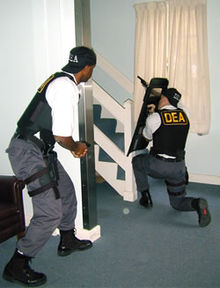
Back منع المخدرات Arabic Prohibición de drogas Spanish Päihteiden kielto Finnish Prohibition des drogues French Proibizionismo delle droghe Italian Forbud mot rusmidler NB Io̍h-bu̍t ê kìm-chí ZH-MIN-NAN

The prohibition of drugs through sumptuary legislation or religious law is a common means of attempting to prevent the recreational use of certain intoxicating substances.
An area has a prohibition of drugs when its government uses the force of law to punish the use or possession of drugs which have been classified as illegal. A government may simultaneously have systems in place to regulate both illegal and legal drugs. Regulation controls the manufacture, distribution, marketing, sale, and use of certain drugs, for instance through a prescription system. For example, in some states, the possession or sale of amphetamines is a crime unless a patient has a physician's prescription for the drug; having a prescription authorizes a pharmacy to sell and a patient to use a drug that would otherwise be prohibited. Although prohibition mostly concerns psychoactive drugs (which affect mental processes such as perception, cognition, and mood), prohibition can also apply to non-psychoactive drugs, such as anabolic steroids. Many governments do not criminalize the possession of a limited quantity of certain drugs for personal use, while still prohibiting their sale or manufacture, or possession in large quantities. Some laws (or judicial practice) set a specific volume of a particular drug, above which is considered ipso jure to be evidence of trafficking or sale of the drug.[citation needed]
Some Islamic countries prohibit the use of alcohol (see list of countries with alcohol prohibition). Many governments levy a tax on alcohol and tobacco products, and restrict alcohol and tobacco from being sold or gifted to a minor. Other common restrictions include bans on outdoor drinking and indoor smoking. In the early 20th century, many countries had alcohol prohibition. These include the United States (1920–1933), Finland (1919–1932), Norway (1916–1927), Canada (1901–1948), Iceland (1915–1922) and the Russian Empire/USSR (1914–1925). In fact, the first international treaty to control a psychoactive substance adopted in 1890 actually concerned alcoholic beverages[1] (Brussels Conference).[2] The first treaty on opium only arrived two decades later, in 1912.
- ^ Pan, L (1975). Alcohol in Colonial Africa (PDF). Forssa: Scandinavian Institute of African Studies.
- ^ Seddon, Toby (2016). "Inventing Drugs: A Genealogy of a Regulatory Concept". Journal of Law and Society. 43 (3): 393–415. doi:10.1111/j.1467-6478.2016.00760.x. ISSN 1467-6478. S2CID 151655016.
© MMXXIII Rich X Search. We shall prevail. All rights reserved. Rich X Search